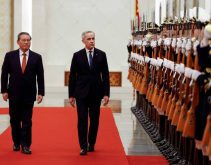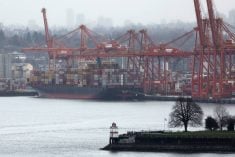If Canada wants to continue to grow its agriculture trade in one of the fastest growing regions of the globe, it needs a new strategy, says a veteran trade expert.
And a ‘trade mission’ strategy in the Indo-Pacific region isn’t enough, said Meredith Lilly, who holds the Simon Reisman Chair in International Affairs at Carleton University.
“Economic interests can no longer be separated from broader foreign policy and defence objectives, and I think this is something that makes Canada really uncomfortable,” said Lilly, who was a foreign affairs and trade advisor to former prime minister Stephen Harper.
Read Also

Farmfair International boosts accessibility with weekend schedule shift
Farmfair International is changing its scheduling format to include the weekend and hopefully attract even more attendees.
“We have long sought to benefit from Indo-Pacific economic growth without getting our hands dirty in some of the deeper defence and foreign policy challenges.”
The Indo-Pacific region — home to 60 per cent of the world’s population and accounting for 40 per cent of global GDP — is already important to Canada’s ag sector,
It accounts for half of non-durum wheat exports, 75 per cent of lentil and pea exports and more than 40 per cent of canola seed, oil and meal exports.
Not wanting to mix trade with complex foreign policy and defence issues is understandable, but Lilly said times have changed.
“It’s no longer possible to separate those things as neatly as we would have liked to,” she said. “We can’t just be in the CPTPP (Comprehensive and Progressive Agreement for Trans-Pacific Partnership) and not be thinking about what’s happening in maritime security, for instance.”
It’s also becoming increasingly difficult not to ‘pick a side.’ Russia’s invasion of the Ukraine reinforces this point.
“We also see a U.S.-China rivalry increasing in the coming years,” Lilly said. “I think all countries in the region want to avoid choosing sides.”
But there are times where choices need to be made. Lilly points to Canada’s Huawei 5G decision as an example.
“We took three years to make it because we were so incredibly uncomfortable with picking sides on this issue,” she said.
‘Strategic error’
“Canada has looked to China as sort of a counterweight to our trade dependence with the United States,” Lilly said.
But she suggests those efforts amounted to swapping reliance on one big market with another.
“I think that that was a strategic error on Canada’s part and something that we need to move away from,” she said.
In May, 13 countries announced they were creating the Indo-Pacific Economic Framework. Canada is not part of the group even though it and seven of the 13 (Japan, Brunei, Malaysia, Singapore, Vietnam, Australia and New Zealand) are part of the trade deal called the Comprehensive and Progressive Agreement for Trans-Pacific Partnership.
The U.S., which was pulled out of the Trans-Pacific deal by former president Donald Trump, is part of the new alliance, which also includes India, South Korea, Indonesia, Thailand and the Philippines.
Lilly suggested that because the U.S. is Canada’s biggest and most important trading partner and also its neighbour, that relationship should be reflected in this country’s Indo-Pacific strategy. Aligning with the Americans could also open doors and ameliorate perceptions of Canada’s irrelevance to the region.
“The criticisms of Canada that I’ve encountered in the past at forums like ASEAN (Association of Southeast Asian Nations) and APAC (Asia Pacific) is that we’re inconsistent — we’re sort of this fair-weather friend,” Lilly said.
She stressed the importance of demonstrating Canada’s long-term commitment to the region and shaking off the transactional, economic self-interest reputation that it has, fairly or unfairly, earned.
Canada’s invisibility in the Indo-Pacific region is a big obstacle. Many experts say the country’s late arrival to the party in the region means it will be playing catch up.
European countries, including the U.K., France, Germany and the Netherlands, are ahead of Canada in the region, said another participant in a webinar put on by the Macdonald-Laurier Institute.
“We have been exceedingly slow to realize the full potential and challenges of what is now known as the Indo-Pacific region,” said James Boutilier, an expert with the Ottawa think tank.
In fact, Canada may have regressed in the past few decades, pointing out that in the 1980s, its trans-Pacific trade exceeded trans-Atlantic trade, Boutilier said.
Lilly echoed that sentiment.
“Canada’s timing is something worth underscoring — we are very late to the party,” she said. “We are sort of the last ones on the dance floor, and there’s maybe no one left to dance with.
“The U.S., Australia, Japan all have this co-ordinated, concerted path for the region, and we’re not part of it, and we should be really worried about that and the reasons for it.”
Nevertheless, there is reason for optimism.
The Canola Council of Canada, Cereals Canada and Pulse Canada are pushing for a new trade diversification office in the region, and that bodes well for the agricultural sector, panellists said.
— A version of this article first appeared in the Manitoba Co-operator.















